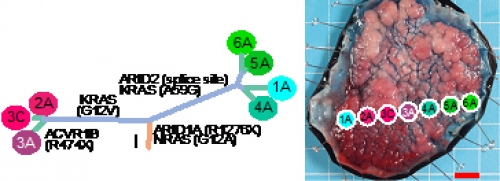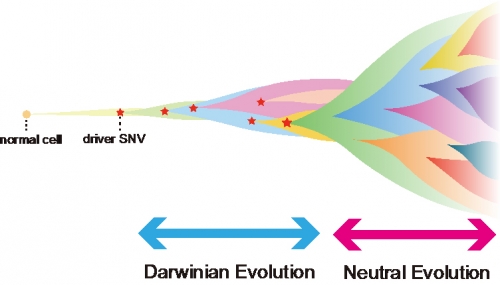研究成果 Research Results
- TOP
- News
- Research Results
- A temporal shift of the evolutionary principle shaping intratumor heterogeneity in colorectal cancer
A temporal shift of the evolutionary principle shaping intratumor heterogeneity in colorectal cancer
2018.07.31Research ResultsLife & Health
Advanced colorectal cancer harbors extensive intratumor heterogeneity shaped by neutral evolution (Uchi R., PLoS Genet 2016), however, intratumor heterogeneity in colorectal precancerous lesions has been poorly studied. By integrating findings from two independent studies, this study may advocate a novel evolutional model of colorectal cancer fostering intratumor heterogeneity.
Prof.Mimori K. (Kyushu University), Prof.Miyano S. and Niida A. (Tokyo University) and Prof. Murakami K. and Saito T. (Oita University) implemented multiregion whole-exome sequencing on 10 early colorectal tumors, which contained adenoma and carcinoma in situ. By comparing with sequencing data from advanced colorectal tumors, the group shows that the early tumors accumulate a higher proportion of subclonal driver mutations than the advanced tumors, which is highlighted by subclonal mutations in KRAS and APC. They also demonstrate that variant allele frequencies of subclonal mutations tend to be higher in early tumors, suggesting that the subclonal mutations are subject to selective sweep in early tumorigenesis, while neutral evolution is dominant in advanced ones.
This study establishes that the evolutionary principle underlying intratumor heterogeneity shifts from Darwinian to neutral evolution during colorectal tumor progression.
The paper, ‘A temporal shift of the evolutionary principle shaping intratumor heterogeneity in colorectal cancer’ has been published in the journal of Nature Communications.
(DOI: 10.1038/s41467-018-05226-0)

Fig. 1. The phylogenic tree and geographic mapping of samples from a representative case. We found small number of driver mutations (ARID1A and NRAS) in trunk and many sublonal driver mutations, such as branched evolution of KRAS (G12V and A59G) in different branches.

Fig. 2. New model of colorectal cancer evolution. During early tumorigenesis, multiple subclones harboring heterogeneous mutations on different driver genes appear and constitute ITH by Darwinian evolution. While the late phase, extensive ITH is generated by neutral evolution.
Journal Reference
A temporal shift of the evolutionary principle shaping intratumor heterogeneity in colorectal cancer, ,Nature Communications , 10.1038/s41467-018-05226-0Research-related inquiries
- TOP
- News
- Research Results
- A temporal shift of the evolutionary principle shaping intratumor heterogeneity in colorectal cancer































